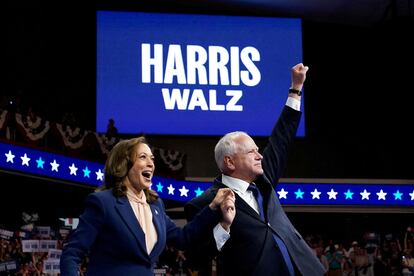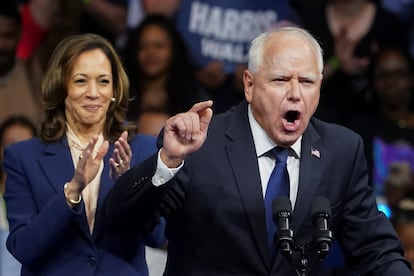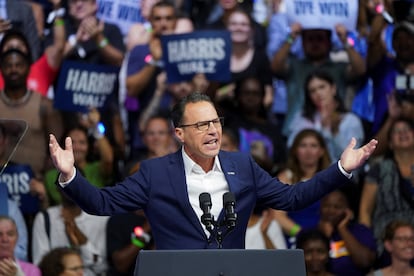Harris and Walz’s election dance: Democratic ticket excites voters at Philadelphia presentation
The Minnesota governor used the occasion to launch a first attack on the Republican candidate: ‘Make no mistake, crime was up under Donald Trump... That’s not even counting the crimes he committed’


The atmosphere was festive, like a wedding. U.S. Vice President Kamala Harris and Minnesota Governor Tim Walz had just said “I do,” joining together as a political couple for the next three months, or the next four to eight years. After the ceremony — the announcement that the vice-president and Democratic presidential candidate had selected the former high school teacher and football coach as number two on her ticket — the first dance: a rally in front of over 14,000 people according to the organizers, delivered to the duo in Philadelphia (Pennsylvania), to the sound of the campaign slogan: “When we fight, we win,” a toast to the bride and groom in this electoral marriage.
The crowd, as varied as it was diverse, had been waiting for hours to enter the Liacouras Sports Pavilion at Temple University in Philadelphia. Mothers with teenage children, young African-American women, Latino retirees... All of them with signs, in red, white and blue, bearing the names of their candidates, and lights on their wrists with the colors of the American flag that lit up more intensely the louder the shouts and applause became. An audience full of dynamism, very different in its energy from the ones that attended the electoral events — staged with considerably more modest capacities and an almost resigned attitude — of President Joe Biden before his withdrawal from the race.
The enthusiasm was aided by polls showing that Harris’ campaign has gained ground against Trump’s and is already in a technical tie with the Republican candidate, or even slightly ahead. “We’re the underdogs,” the vice president declared amid cheers, “but we have the momentum. And we know exactly who we’re up against.”
“Thank you for bringing back the joy,” the flamboyant vice-presidential hopeful said to open his speech. Walz exuded enthusiasm: “I couldn’t be prouder to be on this ticket, and to help Vice President Harris become next President of the United States of America.” The governor of Minnesota also spoke of his roots in small-town Nebraska, in the Midwest, the geographic and sentimental heart of America: “I was born in West Point, Nebraska and lived in Butte, a small town of 400 where community was a way of life. Growing up, I spent the summers working on the family farm. My mom and dad taught us to show generosity toward your neighbors and to work for the common good.”

The presentation of the Democratic ticket was more about making connections and leaving a good taste in the mouth than getting into the depths of government programs; there are weeks ahead for that. Walz resorted to a trademark combination of serious content - especially in highlighting the differences between the Democratic candidacy and its Republican opponents - laced with jokes and sly wit.
“Make no mistake, crime was up under Donald Trump... That’s not even counting the crimes he committed,” he blurted out at one point. The former president, Walz added, “sees the world a little differently than us. He doesn’t know the first thing about service ... he’s too busy serving himself. Donald Trump’s not fighting for you or your family. He never sat at that kitchen table, like the one I grew up at, wondering how we were going to pay the bills. He sat at his country club in Mar-a-Lago wondering how he can cut taxes for his rich friends.” And he repeated a phrase that has made him famous: “These guys are creepy. And yes, just weird as hell.”
In her speech, Harris emphasized Walz’s image as an ordinary person, but one full of common sense, “a great patriot” and a military veteran. When she began the search for a VP pick two weeks ago, she commented that he wanted someone who would help unite a polarized country, fight for the middle class, and defend basic rights. “I found such a leader,” she declared when introducing him.
“Coach Walz and I may hail from different corners of this great country. But our values are the same,” she maintained. “We both believe in lifting people up, not knocking them down.”
If it was important at this rally to sow a positive and optimistic image of themselves, and of their political marriage, it was equally so to launch a message of unity, on two fronts. On the one hand, toward a polarized country. On the other, within the party, after an expedited selection process for a running mate in the two weeks since Harris assumed the Democratic candidacy, instead of the usual period of several months in the normal electoral processes, and in which each faction of the party had wanted to position its preferred choice.
The loser in that process was Pennsylvania Governor Josh Shapiro, 51, who is considered one of the great rising stars of the party. The former attorney general of his home state, who had been the front-runner in the betting pools, was dropped at the last minute in favor of Walz, whose name was absent from the lists until two weeks ago.
In his speech Walz praised Shapiro, who had preceded the candidates on stage with a presentation evocative of Barack Obama’s rhetoric, in which he lauded “my friend Kamala Harris, whom I’ve known for over two decades” (both were attorneys general of their respective states) and “a great man and a good friend,” Walz, “whom we thank for choosing our city of Philadelphia,” to announce their joint campaign.
Harris selected the Minnesota governor and former congressman because of her chemistry with him, at least in part. But also because of their complementarities. She, the daughter of academics, of Jamaican-American and Indian descent, raised in progressive California and with limited experience in the halls of Capitol Hill. He, from rural, deep-country America, with a varied life history and the appearance of a jocular grandfather.
Harris was attracted by Walz’s sterling reputation in Congress, where he was a legislator for 12 years, his record of accomplishment and his ability to build bridges, as well as his ability to communicate, with simple speech that lends itself to humor and straight-shooting. He ad-libbed the “weird” comment to describe the Republican ticket in a TV interview two weeks ago and it has since become a Democratic meme and was a recurring phrase among the entire Pennsylvania Democratic political hierarchy that provided the opening act at the rally.

Walz’s selection has been greeted, at least in the public eye, with satisfaction among the Democratic ranks, who have unanimously praised the appointment. Social networks were also overflowing with praise from the party’s grassroots supporters for their new representative, at an optimistic moment for the campaign after months of trailing Trump.
After the rally in Philadelphia, Harris and Walz will embark on a tour of the swing states, those that will decide the outcome of the elections on November 5: Wisconsin, Michigan, Georgia, Arizona, and Nevada, in addition to Pennsylvania. A scheduled stop in North Carolina Thursday has been postponed due to the proximity of Hurricane Debby.
With the whistlestop tour, the duo is seeking to consolidate the energy generated since Harris took the reins and to attract support among undecided voters — a shrinking group — ahead of the Chicago convention on August 19. From there, it will be up to the voters to decide whether the honeymoon between the Democratic couple and their electorate will continue past November.
Sign up for our weekly newsletter to get more English-language news coverage from EL PAÍS USA Edition
Tu suscripción se está usando en otro dispositivo
¿Quieres añadir otro usuario a tu suscripción?
Si continúas leyendo en este dispositivo, no se podrá leer en el otro.
FlechaTu suscripción se está usando en otro dispositivo y solo puedes acceder a EL PAÍS desde un dispositivo a la vez.
Si quieres compartir tu cuenta, cambia tu suscripción a la modalidad Premium, así podrás añadir otro usuario. Cada uno accederá con su propia cuenta de email, lo que os permitirá personalizar vuestra experiencia en EL PAÍS.
¿Tienes una suscripción de empresa? Accede aquí para contratar más cuentas.
En el caso de no saber quién está usando tu cuenta, te recomendamos cambiar tu contraseña aquí.
Si decides continuar compartiendo tu cuenta, este mensaje se mostrará en tu dispositivo y en el de la otra persona que está usando tu cuenta de forma indefinida, afectando a tu experiencia de lectura. Puedes consultar aquí los términos y condiciones de la suscripción digital.








































